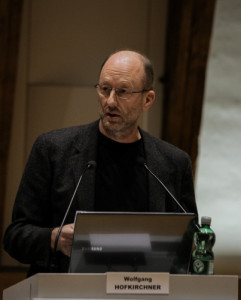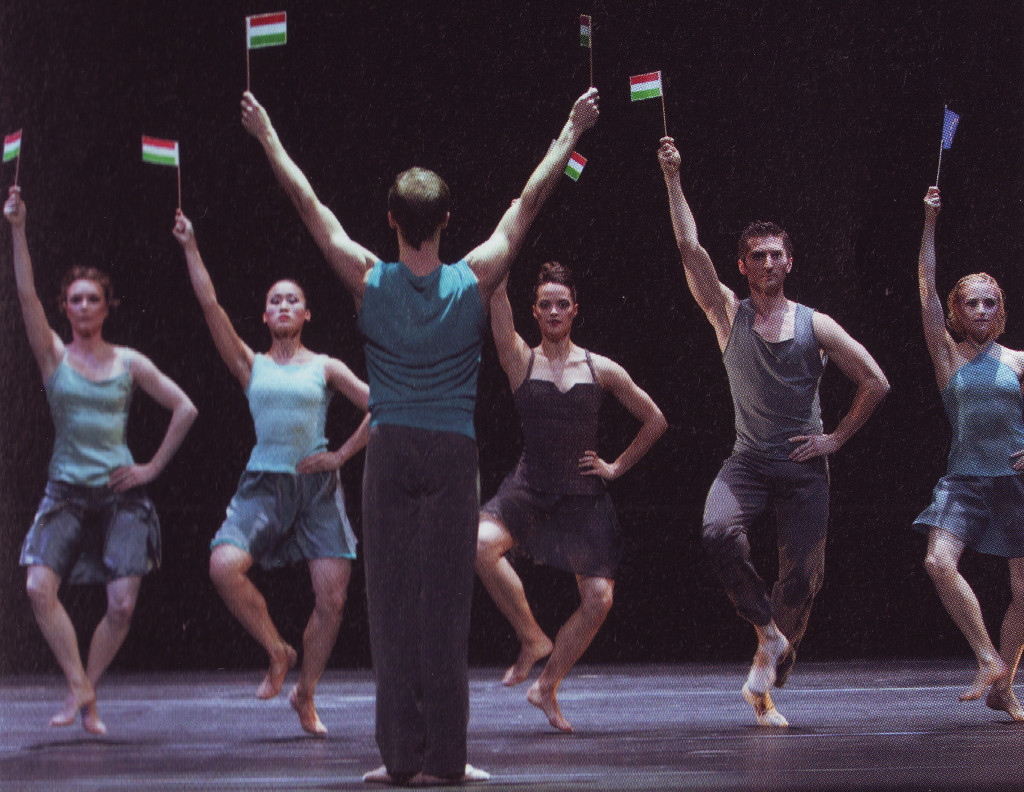why freedom of information is not enough – communication for co-operation
plenary address to the international conference “freedom of information under pressure. control – crisis – culture”, tu wien, 28 february – 1 march (photo: Edward Chapon)
A week ago I watched a ballet. Martin Schläpfer choreographed for his dance company “Ballett am Rhein”, amongst other pieces, “Ungarische Tänze” (Hungarian Dances) after the music of Johannes Brahms. It was performed at the Festspielhaus St. Pölten.
(photo: Programm/Ballett am Rhein, Festspielhaus St. Pölten)
One of the dances related to the freedom of press. I’d like to tell you the story line that was presented by the dancers against the background of Brahms’ pathetic music, which turned the performance into a persiflage: first, a man with a newspaper is barred from reading it, he is fettered by a woman with a rope and, finally, dragged off the scene; then a kind of cheerleader appears who waves two flags; later on, he teaches flag-wavers who neatly line up in a row; however, as you can see on the right of the picture, one dancer performs with the flag of the European Union, whereas everybody else has a national flag – the flag of Hungary, of course; what happens then is that the lead dancer replaces the flag of hers with the “right” one, pops the “wrong” flag into his buttocks and exits.
In my interpretation, this criticism of the restrictions of the freedom of press by the Hungarian government is a wonderful metaphor for an answer to the question “Why is freedom of information under pressure?“.
The answer that is given, is: there are some interests interfering with the generation and utilisation of some information, because that information contains or supports values that are different from, or opposite to, the values that are needed to justify the pursuit of those interests. That is, there are conflicting values because there are conflicting interests, and there is at least one interested side that exerts power to solve the conflict in a one-sided way – by establishing public consistency of all values with their interests and eradicating the informational basis for the promotion of incompatible values. The side in question may be in power or may seize power in cultural, political, or economic terms.
Moreover, in our example, it is a national interest (the Hungarian one) the values of which turn out nationalistic when going to outbalance and override values of inter-, trans- or supranational interest (the EU ones). To generalise, it is always a particular interest implying particularistic values when attempting to dominate universal ones; it is always a part being or becoming partial when having usurped a whole or when rebelling against a whole, it is always a worm’s-eye view that it attempts to impose when not minding what a bird’s eye view could be for the sake of all affected.
If this is so, then freedom of information is seen in a different light. That is, freedom of information is under pressure, if and when the public sphere is instrumentalised to serve one part of competitive interests rather than addressing and expressing the interests of all in a co-operative discourse.
Why am I stressing this? There are three reasons for that:
- First, human communication is from the outset co-operative.
- Second, in the course of history, communication has become ever more idiotic.
- Third, given the current societal conditions, freedom of information is not enough.
First, human communication is from the outset co-operative.
According to anthropologist Michael Tomasello, our great ape ancestors were social beings, but “they lived mostly individualistic and competitive lives” (2014, 4), they were “individually intentional and instrumentally rational” (30) as great apes are still today. Early humas began to speciate not until they took advantage of going beyond “individual intentionality” and adopted “more complex forms of cooperative sociality” (31), which made them achieve shared goals and brought about “shared intentionality”.
Tomasello hypothesises a first step towards shared intentionality “in the context of collaborative foraging” (33), that is hunting of large game and gathering of plant foods, around 2 million years ago and culminating 400.000 years ago. Multiple and vanishing dyadic relationships formed in which early humans shared a joint goal, understood their individual role and could take the perspective of the other. In order to support the negotiation of the joint goal and the coordination of collaboration, human communication originated with “a commitment to informing others of things honestly and accurately, that is, truthfully” (51).
The second step is that from early to modern humans who became “thoroughly group-minded individuals” (80) in larger groups, in which they “had to be prepared to coordinate with anyone from the group, with some kind of generic other” (81) some 200.000 years ago; “the individual no longer contrasted her own perspective with that of a specific other…; rather, she contrasted her own perspective with some kind of generic perspective of anyone and everyone about things that were objectively real, true and right from any perspective whatsoever” (122). For Tomasello, the anthropological sense of communication is co-operation.
Second, in the course of history, communication has become ever more idiotic.
Evolution did not take a linear way. The first groups were tribes. Greek antique civilisation ushered in another stage of social formation, deserving the name “idiotism”, which I borrow from Neil Curtis (2013), author of a book with the same title. Etymology shows, “idios” meant in Greek Antiquity “the personal realm, that which is private, and one’s own” (12). In Curtis’ view, “idios” bears also the stamp of “being enclosed”. He says that “the creation of the private through the enclosure of public or commonly held resources has historically been the primary means by which property has been secured for private use” (12). By the term “idiotes”, then, a person was denoted that is concerned with his personal realm only, with his own, and not with, say, the res publica and the fate of other human beings. Curtis convincingly demonstrates that neoliberalism, not only in ideology but also as a distinct social order, epitomises the principle of the “idiotes”. Hence “idiotism” as signifyer of our current society. However, “idiotism” as a feature of society that functions via self-interested, self-concerned individuals goes, in fact, back to social formations in which domination appeared – the institutionalised instrumentalisation of humans for one’s own interests, which goes hand in hand with the enclosure of the commons and the denial of free access to the latter. Global financial capitalism is just carrying idiotism to extremes. It originated, when selfish “I”s, after having disguised themselves as incarnations of the tribal “We” overtly entered the stage of heteronomic societies. The actors have become self-regarding persons of their own rather than other-regarding and thinking is short-sighted and does not take into consideration harmful effects on other parts of the system; competition has been prioritised on the higher levels of society over co-operation, which is reserved for the lower levels only.
Communication is for co-operation only, if and when it serves overall competition.
Third, given the current societal conditions, freedom of information is not enough.
The Hungarian dance example shows us:
- in the event of crises, pressure comes overtly: the lead dancer makes use of his power to take away the “wrong” flag – like in Greece, as our Greek colleagues testified yesterday;
- but in normal times, as long as there is one “wrong” flag only among a legion of “right” ones, pressure comes in the disguise of plurality when professional media journalists, for reasons whatsoever (because they experience soft pressure, as Harald Schumann indicated yesterday; or because they have no time any more to analyse what they report and comment, as Susanne Scholl indicated yesterday, and rely on obscure sources like p.r. agencies or follow their own prejudices, if they aren’t willingly partisan), contribute to the forming of a mainstream that camouflages its partiality by pretending to be everyman’s opinion, which makes itself a self-fulfilling prophecy; this process of ideological phasing – „Gleichschaltung“ – works as underlying process in times of crises too, as colleagues from Greek evidenced yesterday; and the blogosphere is, in principle, no exemption.
What is needed today, is another leap in anthroposociogenesis. Biological reductionists try to tell us that the nation state is the highest level of grouping for which we are made by our genes. However, if we don’t come to terms with the fragmentation, heterogenisation, disintegration of our societal build-ups, we will face extermination. Thus let’s be optimistic: our species had already accomplished a major transition to a more co-operative social life.
What is needed today, is a unity-through-diversity build-up of nascent world society all levels up and down. Such an edifice needs to be based upon the diversity of individuals, serving their true and best interests by acknowledging that they can do so exclusively when in harmony with the overarching system and thus without doing harm to other system components; actors need to be capacitated to reflect their own position and the position of others from the perspective of the overall social system. And, in principle, we are already endowed with such a capacity.
What is needed today, is communication for co-operation. The current state of mediated communication is a big obstacle on the way to a “global sustainable information society” (Hofkirchner).
Freedom of information, the plurality of opinions, is just a necessary condition to enable social systems and their actors to get ready for the transition required. Freedom of information is a precondition, but not the end.


